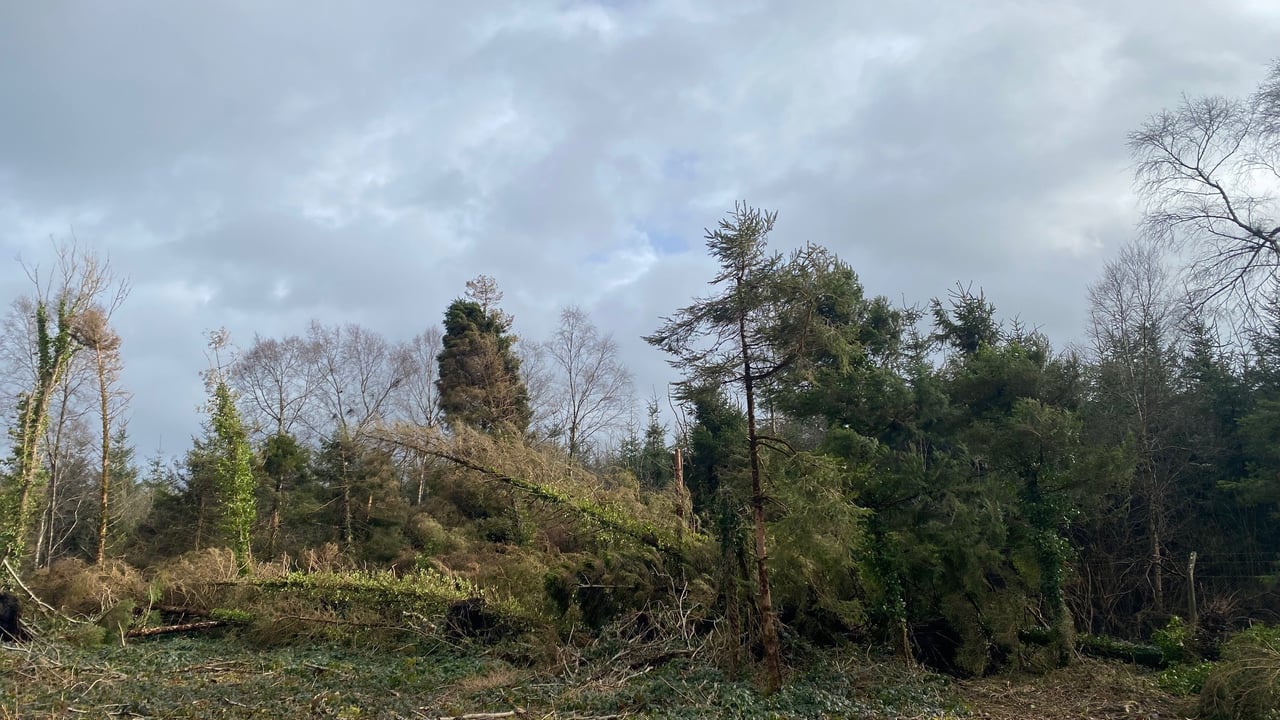Review of Storm Éowyn makes recommendations on forestry management and backup power
The review of the coordinated response to Storm Éowyn has been published this week.
The National Directorate of Fire and Emergency Management (NDFEM), a unit within the Department of Housing, Local Government and Heritage, published the report on the storm that struck Ireland on January 24.
The report says that Ireland experienced one of the "most dangerous and destructive storms in living memory".
"The impacts of Storm Éowyn were particularly severe and prolonged in remote and rural communities across the western seaboard, the north-west and midlands of the country."
The storm prompted nationwide red wind warnings and triggering the activation of the National Emergency Coordination Group (NECG).
Response actions
Commenting on the report, national director of the NDFEM, Keith Leonard said that work has been ongoing since Storm Éowyn to address issues identified in the response.
"This includes guidance on establishing, coordinating and operating community support centres within communities affected by severe weather, increasing generator capacity in Irish Water and the addition of satellite communication capacity to strengthen the emergency services networks," Leonard said.
"This review identifies the best approach necessary to achieve increased resilience in the years ahead."
Leonard said the Minister for Housing, Local Government and Heritage, James Browne met with all NECG members to overview preparedness and response arrangements in advance of winter 2025/2026.
"The NDFEM stands ready to work with all stakeholders to deal with any adverse weather events this winter," Leonard added.
Local authorities are assigned the lead agency role for coordinating the local response to severe weather emergencies as well as delivering a significant portion of that response effort.
The review said that the local authorities "consistently demonstrate both leadership and capacity in dealing with severe weather, supported where necessary by the NECG".
Forestry management
The report has made recommendations on vegetation and forestry management.
The report said that in the context of protecting key electricity infrastructure and limiting the impact of future storms, legislative measures should be progressed to:
- Provide for enhanced proactive vegetation management measures to protect the electricity and telecommunications network, including powers to address vegetation that presents risks to the electrical network;
- To include establishment of height limitations for roadside vegetation and the powers and responsibility to enforce same;
- Provide for the establishment and maintenance of forestry corridors to improve resilience and operational safety of the electricity and telecommunications network.
The report said that disruption to gas/electricity supply is a key area identified in the national risk assessment.
"The cascading impacts of the disruption to the electricity supply following Storm Éowyn highlight the need for all operators of essential services to ensure adequate backup power generation is available," the report said.
"While power to the majority of affected customers was restored within one week, complete power restoration following Storm Éowyn took 18 days.
"Whilst it is not envisaged that every element of critical infrastructure be designed to be available for an indefinite duration without mains power, major subsystems within critical services must be designed to endure long periods without mains electrical power.
"Detailed guidance on backup power generation should be developed for operators of essential services through the sectoral groups established by the Department of Defence and the NCSC."
Public events
The report has recommended that event organisers should cancel events in areas where an Orange Wind Warning threshold is forecast.
"Event sites and funfairs with temporary structures of all kinds may need to be considered for closure at a lower threshold, which should be set by the event organiser at the event planning stage," the report said.
"All event organisers should have arrangements in place to monitor winds speeds at the site of an outdoor event."
The report also recommends that a programme similar to 'Be Winter Ready' should be put in place to support household resilience and to encourage societal resilience within communities with a planning assumption for the loss of essential services for 72 hours.
According to the report, this will allow responders to focus on the people most in need during exceptionally severe and widespread events.
The completion of the review recommendations are being progressed through the Government Task Force on Emergency Planning.





